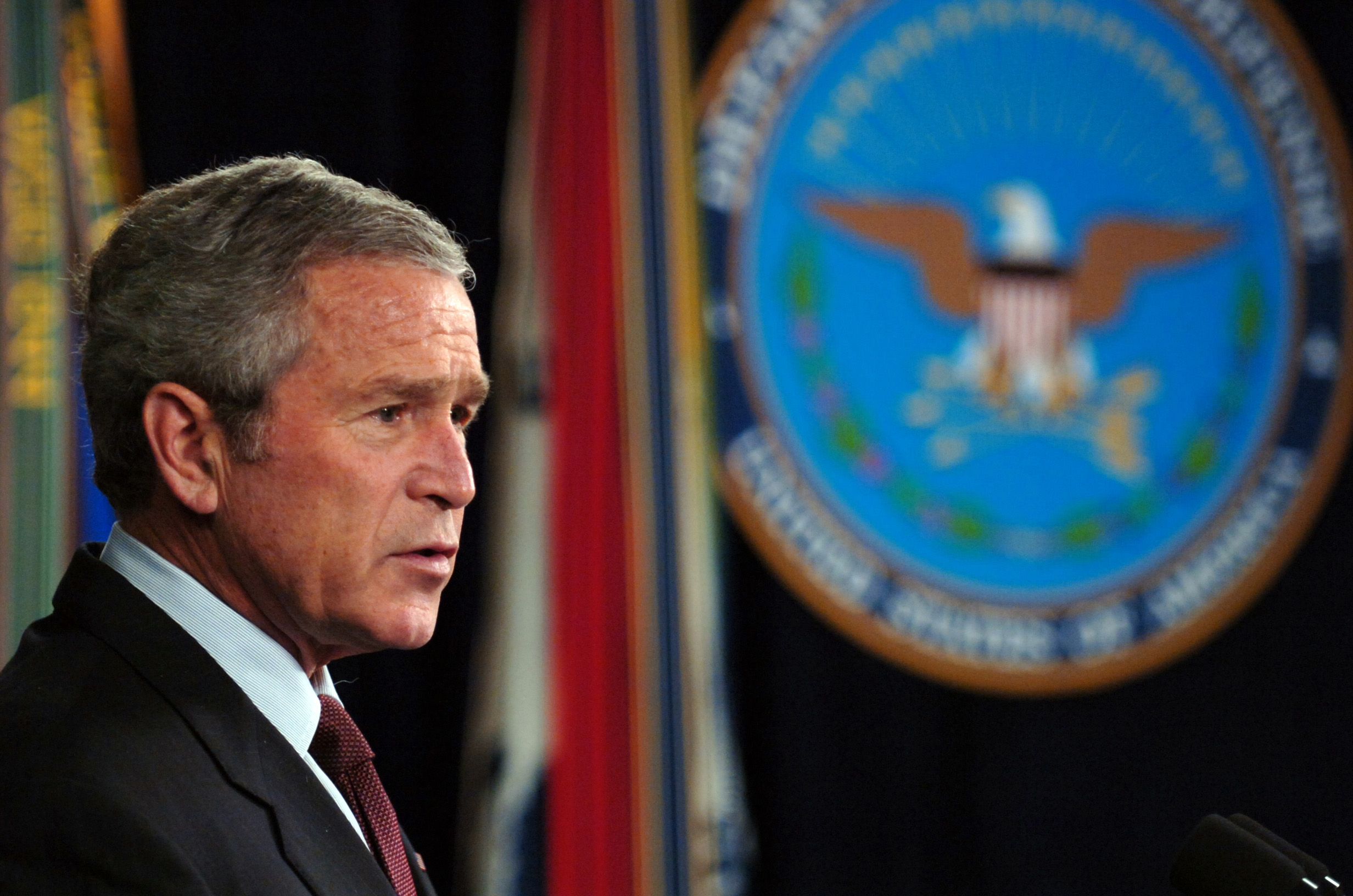The author received a Bachelor of Arts degree in Political Science from Northeastern University. He worked at the CIA for 26 years.
Members of the George W. Bush administration, including the former president, continue to maintain that the invasion of Iraq in 2003 was an intelligence failure. This article refutes that contention and argues that while some of the intelligence relating to Iraq was flawed, the invasion was primarily a policy failure that will eventually cost U.S. taxpayers more than one trillion dollars. Besides the financial cost, thousands of Iraqis have died since the invasion — many due to fighting between Muslim sects, and more than one million Iraqis are now displaced persons because of Bush‘s decision to go to war. Also by removing Saddam Hussein, the Bush administration eliminated Iran’s principal enemy, thus emboldening the mullahs in Tehran to become more aggressive toward Western interests. Furthermore, money and resources that could have been used in Afghanistan were redirected to the war in Iraq therefore limiting military efforts against the main U.S. enemy, al-Qaeda. The bottom line: Bush administration officials orchestrated a campaign of misinformation about the threat posed by Saddam to justify the invasion.
Key administration officials had been advocating that the United States remove Iraqi leader Saddam Hussein for years before Bush became president. For example, as early as 1997, Paul Wolfowitz, who eventually became Bush’s Deputy Secretary of Defense, wrote in the Weekly Standard that “the substantial use of military force” should be used to remove Hussein. Also in 1998 Donald Rumsfeld, who became Bush’s first Secretary of Defense three years later, declared that Saddam must be overthrown. Rumsfeld called for sustained air bombardment of Baghdad. In the run up to the war, senior Bush officials “waged a carefully orchestrated campaign of misinformation about the threat posed by Saddam Hussein’s Iraq.“ Also, Vice President Dick Cheney served as the neoconservatives most outspoken advocate for removing Saddam, undoubtedly one of the most despicable leaders of the last half of the 20th century. However, Cheney misled the country about reasons for the invasion. Even one high-ranking Republican agrees with that contention. Former House Majority leader Richard Armey (R-Texas) stated in 2008, “Six years earlier, Cheney purposely told me things he knew (about Saddam) to be untrue.” Armey said that if Cheney hadn‘t exaggerated the threat posed by Saddam, “I would have publicly opposed (the Iraq War) resolution right to the bitter end, and I believe I might have stopped it from happening.” After leaving his position at the White House, former Bush Press Secretary Scott McClellan said in 2008 that the Iraq war was sold to the American people with a sophisticated “political propaganda campaign” aimed at “manipulating sources of public opinion.”
So, why did the United States invade Iraq? Bush administration officials pushed the line that Saddam possessed and was further developing weapons of mass destruction (WMD). WMD refers to biological, chemical and nuclear weapons. There is plenty of evidence that Iraq had chemical weapons. One of Saddam’s cousins was nicknamed “Chemical Ali” for using such weapons against the Kurds in Northern Iraq. However, the case for Saddam developing biological and nuclear weapons was more speculative. In fact, Ambassador Joseph Wilson, the husband of CIA operative Valerie Plame, traveled to Africa to investigate whether Saddam was trying to obtain yellowcake (uranium oxide) to make nuclear weapons. When Wilson reported his negative findings, the Bush administration launched a campaign to discredit him, and one of the repercussions was the outing of Plame as a covert officer. Eventually, Cheney’s former chief of staff Lewis “Scooter” Libby was found guilty of perjuring himself about the leaking of Plame’s name.
Revealing a covert officer’s name is illegal. Apparently, Libby became the fall guy. Regardless, after he was sentenced to more than two years in prison, President Bush immediately granted Libby a pardon. Bush also invoked executive privilege, “ to keep Congress from seeing the FBI report on an interview with Vice President Dick Cheney and others related to the administration’s leak of CIA operative Valerie Plame’s identity in 2003.” Eventually, a 28-page FBI summary revealed that on 72 occasions during a May 2004 interview, Cheney claimed he could not be certain of his answers to questions about matters large and small in the Plame controversy.
In her autobiography, Fair Game My Life as a Spy, My Betrayal by the White House. Plame writes, “The Libby trial shocked me in showing just how reckless senior (Bush) government officials who should have known better, who should have been much more diligent in protecting me and every CIA officer, tossed around my name with those who had no need to know.” Former operations officer Henry A. Crumpton expressed the feelings of almost everyone in the intelligence community when he wrote, “ For political gain or for any reason, how could White House officials jeopardize the sacrosanct cover and life of a CIA officer? How could they risk her agent network, those foreigners who also risked their lives spying for America?”
Another action that puzzled the intelligence community was why the Bush administration listened to Ahmad Chalabi, a Shiite Iraqi national, who had been pushing for the overthrow of Saddam (a Sunni) for years. Chalabi is the person who said that U.S. troops would be welcomed in Iraq with open arms — a statement that defies logic. The State Department continuously warned the other Bush officials not to listen to Chalabi. He was a convicted felon who embezzled millions of dollars from a Jordanian bank. Chalabi claims that he was tried in absentia, which is true because he fled Jordan just before he was to be arrested. After Saddam’s overthrow, Chalabi returned to Iraq and became oil minister. Eventually, even senior Bush officials realized that Chalabi was actually double-dealing with America’s Iranian enemies. “He was never the democrat the neoconservatives thought; his idea of Iraqi democracy was a Shiite tyranny of the majority and he got it,” wrote Gary Anderson, a retired Marine Corps colonel, who is an adjunct professor at George Washington University’s Elliot School of International Affairs.
So by cherry-picking intelligence, lying about Saddam’s involvement in the 9/11 attacks, blaming the messenger in the Plame affair, and relying on the statements of a convicted felon, the Bush administration pushed the United States into an almost decade-long war that has had devastating consequences for this country and Iraq. First, the human cost: There are several estimates on how many Iraqis died in fighting since the Bush invasion. At least 100,000 Iraqis are dead, mostly due to fighting between Shiites and Sunnis, but that number could possibly be 50 percent higher. Americans suffered numerous casualties too; more than 4,400 are dead and 33,000 have been wounded. Furthermore, more than 1.5 million Iraqis have become displaced since the 2003 Bush invasion. About one million people fled to Syria and another half million can be seen wandering the streets of Amman, Jordan. Moreover, about 750,000 Christians — mostly Chaldean Catholics — lived in Iraq before the war. Most of them are now dead or have fled their country. An insurgent group has threatened the remaining Iraqi Christians. Al-Qaeda in Mesopotamia said in December 2010 that its fighters would kill “Iraqi” Christians, “wherever they can reach them.”
The cost of the Iraq War could top one trillion dollars for U.S. taxpayers. Long after all U.S. troops vacate Baghdad, there will be continuing costs for treating, diagnosing, and providing medical services to the disabled veterans. The final price will certainly dwarf the previous estimates by the Bush administration, which in 2003 projected that overthrowing Saddam would cost between $50 billion to $60 billion. It is also worth contemplating what would have happened if we had concentrated our efforts on removing al-Qaeda from Afghanistan instead of creating the sideshow in Iraq which eventually became the main event. There were three times, then four times, and eventually five times as many troops in Iraq than there were in Afghanistan. Absent the Iraq invasion, would al-Qaeda still be active in Afghanistan today? Other questions that should be asked are: If not for the war in Iraq, would oil prices have risen dramatically to $140 a barrel during the second Bush term? Also if we did not have the trillion dollar fiasco in Iraq, would the federal debt be so high? Could the economic crisis have been less severe if Bush had not invaded Iraq? It is easy to forecast gigantic deficits when a president tries to fund two wars while cutting taxes. The result has to be deficits that current college students will be paying off for the rest of their lives.
Iran poses more of a threat to U.S. interests than Iraq. However, the consequence of removing Saddam, whose country fought an eight-year war with Iran in the 1980s, emboldened the mullahs in Tehran to become more supportive of Hamas and Lebanese Hezbollah activities against Israeli interests. Also Iran immediately saw the power vacuum developing with Saddam’s removal and stepped in to help the majority Shiites in Iraq with weapons, thus precipitating a religious war against the minority Sunnis.
Apparently the Bush administration lacked the foresight to plan for a post-Saddam Iraq. The decision to invade Iraq appears to have been based on wishful thinking that everything would work out instead of being cognizant of political reality. Presidents should base foreign policy decisions on the best information available. After all, the United States annually spends about $80 billion on intelligence. “If the intelligence community’s assessment pointed to any course of action, it was avoiding a war, not launching one,” wrote Paul Pillar* in early 2012 in the journal Foreign Policy. Did bad intelligence lead to the Iraq War? “No,” says Pillar, “Bad leadership did.”
Leonard Edward Tagg
Political Science
* Paul Pillar, a Middle East expert, served for three decades with the CIA and the National Intelligence Council. He is now a visiting professor at Georgetown University.
Disclaimer: All statements of fact, opinion, or analysis expressed are those of the author and do not reflect the official positions or views of the CIA or any other U.S. Government agency. Nothing in the contents should be construed as asserting or implying U.S. Government authentication of information or Agency endorsement of the author’s views. This material has been viewed by the CIA to prevent the disclosure of classified information.
Paul Pillar, Intelligence and U.S. Foreign Policy (New York: Columbia University Press, 2011), p 16. Wolfowitz quote originally appeared inWeekly Standard, December 1, 1997.
Charles Lewis and Mark Reading Smith, False Pretenses, The Center for Public Integrity, January 23, 2008.
Jeff Leen, “Cheney Linked Hussein to Al-Qaeda, Ex-GOP House Leader Says in Book,” Washington Post, September 16, 2008, p. A19.
Michael D. Sheer, “Ex-Press Aide Writes That Bush Misled U.S. on Iraq,” Washington Post, May 28, 2008, p. A1.
Laurie Kellman, “Bush Claims Privilege to Withhold CIA Leak Records,”Associated Press, USNews.com., July 27, 2008.
Pete Yost, “Cheney FBI Interview, 72 Instances of Can’t Recall,”Associated Press, Google.com, November 2, 2009.
Valerie Plame, Fair Game — My Life as a Spy, My Betrayal by the White House, (New York: Simon & Shuster 2007), p. 286.
Henry A. Crumpton, The Art of Intelligence, (New York: The Penguin Press, 2012), p. 6.
Gary Anderson, “Book Review: A Brilliant Schemer in Iraq,“Washington Times, January 17, 2012. The book reviewed is by Richard Bonin, Arrows of the Night: Ahmad Chalabi’s Long Journey to Triumph in Iraq (New York: Doubleday, 2011.)
Steven Lee Myers, “With New Violence, More Christian Are Fleeing Iraq,” New York Times.com, December 12, 2010.
Paul Pillar, “Think Again: Intelligence,” Foreign Policy, January/February 2012.
The author received a Bachelor of Arts degree in Political Science from Northeastern University. He worked at the CIA for 26 years.



